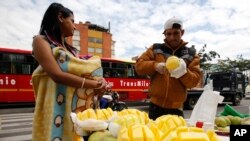As the first hint of dawn stretches over a Colombian neighborhood known as “Little Mene Grande” after the warm, Venezuelan city where so many recent arrivals are from, six men and women rise from worn, flattened mattresses.
The women do their makeup in front of a mirror hanging from the security bars inside a window. One wraps her 4-month-old daughter in a fuzzy yellow blanket. The men don jackets and baseball caps.
Bogota is cold compared to their Venezuelan hometown and their day will be long. The task: Sell 54 mangos at less than a dollar each in hopes of sending a sliver of what they earn to relatives struggling even more back home.
“I never imagined living like this,” says Genesis Montilla, 26, a nurse and single mother who left her three children with their grandmother.
While Venezuela plunges further into political and economic ruin, the flight of its citizens is accelerating, reaching levels unseen in its history. Experts believe nearly one-tenth of its population of around 31 million now lives outside the country. For better-off professionals the preferred destination is Spain or the U.S., where Venezuelans are overstaying their visas in droves and now lead asylum requests for the first time - 18,155 last year alone.
But for many poor people fleeing Venezuela's triple-digit inflation, hours-long food lines and medical shortages, Colombia is the journey's end. The neighboring Andean nation has received more Venezuelans than any other nation. Estimates indicate more than 1 million have arrived in the last two decades, reversing the previous trend of Colombians fleeing war heading to Venezuela.
The most desperate cross illegally through one of hundreds of “trochas,” unpaved dirt roads along Venezuela's porous 1,370-mile (2,200-kilometer) border with Colombia.
“When you talk to Venezuelans, they all say, `I want to come,”' said Saraid Valbuena, 20, who made the journey with her husband and their then 1-month-old daughter earlier this year. “Even though you come here to sleep on the ground, people want to come because they know with a day or two of work at least they'll eat.”
The influx shows no sign of waning and has worried Colombian officials enough that they are crafting contingency plans in the event of an even larger spike or a repeat of a crisis like the one in 2015, when Venezuelan President Nicolas Maduro overnight expelled some 20,000 Colombians.
Recently, Colombia's government sent a delegation to Syrian refugee camps in Turkey to learn how to respond to a sudden wave of mass migration. The United Nations High Commissioner for Refugees is also studying how prepared their offices in Colombia, as well as Brazil and Trinidad and Tobago, are to deal with a potential swell of Venezuelan migrants.
“Since about a year and a half ago, it has been a constant flow,” said Daniel Pages, president of the Venezuelans in Colombia Association. “They need to leave in order to live.”
Officially, Venezuela denies its citizens are fleeing to Colombia. As recently as February, Maduro claimed Colombians were still pouring “en masse” into Venezuela. Venezuela has not released migration statistics in more than a decade.
Valbuena and Montilla share four tiny bedrooms made of cinder blocks with 12 others. They've scrounged used jackets to withstand Bogota's damp, Andean climate. One of the flattened mattresses in a bedroom was pulled from the trash.
“Every day I wake up wanting to leave, but I can't,” says Montilla, who in Venezuela lived in a comfortable home with her children but earned less in one day at an emergency room clinic than the cost of a tube of toothpaste.
On a typical day, Montilla and five others take a bus to a wholesale food market where they purchase mangos. But on this day, mango season is winding down and prices are rising as the fruit becomes scarcer. Instead of about $4 for a bundle of 30 mangos, the seller wants $7.50, nearly double.
They don't have the money.
Instead, they decide to try and sell the 54 mangos still left in the wooden carts they store overnight in a wealthier part of Bogota.
Baby bundled and jackets on, the group departs from their apartment toward the bus station. As they approach the station, two policemen in yellow reflector jackets stop them.
“Identity cards, everyone,” an officer demands.
“We're Venezuelan,” several in the group reply.
The officers, surprised by the group's bluntness, announce that they will call migration, a threat that doesn't faze the Venezuelans. One of the three girls in the group pulls out a border card that allows short trips into Colombia. The officers appear satisfied but tell them to carry ID cards next time.
Decades ago, 4 million Colombians poured into Venezuela at a time when their own nation was engulfed in an armed conflict with guerrillas and Venezuela's oil-rich economy was booming.
Many of the Venezuelans arriving today have Colombian roots, but those who do not find gaining legal status difficult. Unlike nearby Peru, which has offered Venezuelan arrivals temporary work visas, Colombia does not provide any sort of humanitarian legal status to Venezuelans. Refugee visas are available but can take more than two years to process.
In the early years of the late President Hugo Chavez's socialist revolution, fleeing oil executives and other wealthy Venezuelans arrived in Colombia in such numbers that they drove up real estate prices and made getting into elite private schools even more difficult. But the newest arrivals come with little more than the change in their pockets.
Though many come from Venezuela's lower and middle classes, Montilla and her friends have seen even skilled professionals like architects and engineers arriving in Colombia and sleeping in bus stations.
Montilla said she decided to leave when her children began saying, “I'm hungry” and she had nothing to feed them.
She told her children her plans before departing.
“Go,” her oldest son, 10, said. “So that we aren't hungry.”




